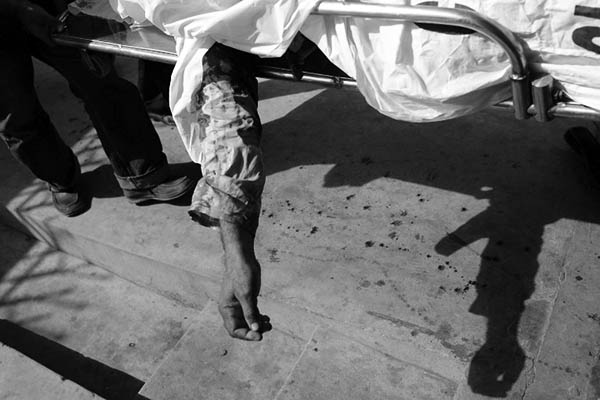
File Photo. Asif Hassan—AFP
Assault in central Wardak province leaves at least 65 dead and worsens already-shaky morale of Afghan troops
At least 65 people were killed in a Taliban-claimed attack on an Afghan intelligence base, sources said on Tuesday, contradicting an official toll in the latest high-casualty assault on beleaguered Afghan forces.
Monday’s attack in central Wardak province targeted an intelligence training facility, officials have said, meaning information remains difficult to independently verify.
The assault, in which militants detonated a Humvee packed with explosives before gunmen opened fire, was followed by a day of confusion, with authorities giving conflicting casualty numbers to media. “We took about 65 bodies out of the rubble yesterday,” said Mohammad Sardar Bakhyari, deputy head of the Wardak provincial council. A senior security official who spoke on condition of anonymity gave an even higher figure of at least 70 killed.
Later on Tuesday the Afghan National Directorate of Security (NDS)—the intelligence agency—announced the toll had been 36 dead and 58 wounded.
Afghan authorities are known to downplay casualty figures as their forces continue suffering what experts describe as “unsustainable” losses since NATO pulled its combat forces from the country in 2014.
Monday’s attack was set to hit already shaky morale.
Earlier, provincial officials said just 12 people had been killed, while other media reported tolls topping 100 deaths.
The Humvee blast at the NDS base in Maidan Shahr, the capital of Wardak province and some 50 kilometers south of Kabul, caused the roof of the compound to partially collapse, images from the scene show. “Then at least three other attackers in a Toyota car who were following the Humvee entered the compound,” said Wardak provincial council member Abdul Wahid Akbarzai on Tuesday. The attackers were killed quickly, he said, but most of the casualties were caused by the roof collapse.
“It is a big loss,” council head Akhtar Mohammad Tahiri said. “The NDS forces are better trained and equipped than the Afghan police and army soldiers who have been dying in record numbers.” He added the militants were dressed in uniforms used by Afghan special forces.
Nearby residents described hearing a “heavy explosion.”
“I saw black smoke,” said Sediqullah, a Maidan Shahr resident. The blast shattered glass inside his house, he said, adding that some of his family members had been injured.
The attackers struck a day after a Taliban suicide bomber targeted the convoy of Logar province’s governor, killing at least seven security guards.
The recent skirmishes follow a flurry of diplomatic activity in recent months by U.S. special peace envoy Zalmay Khalilzad aimed at bringing the Taliban to the table for talks seeking an end to the more than 17-year war.
Afghanistan’s de facto prime minister, Abdullah Abdullah, told a roundtable at the World Economic Forum in Davos on Tuesday that the “fundamental obstacle” to talks remained the Taliban’s refusal to speak directly to the government in Kabul, whom they have long dismissed as “puppets” of the West. He said Kabul is ready to start talks without preconditions.
The insurgents—who are maintaining the upper hand in the conflict—threatened to suspend the fledgling negotiations last week. However on Monday they announced a resumption of talks with U.S. officials in Qatar as the two sides discuss a possible peace deal that could pave the way for the insurgents to participate in the next government.
Washington has not confirmed their claim that the talks are continuing.
Since the start of 2015, when local forces took over from U.S.-led NATO combat troops to secure the country, nearly 30,000 Afghan soldiers and police have been killed, President Ashraf Ghani revealed last year—an average of around 20 per day.
The shocking mortality rate has sent morale to new lows, with a U.S. watchdog noting troop levels falling by thousands in 2018.
